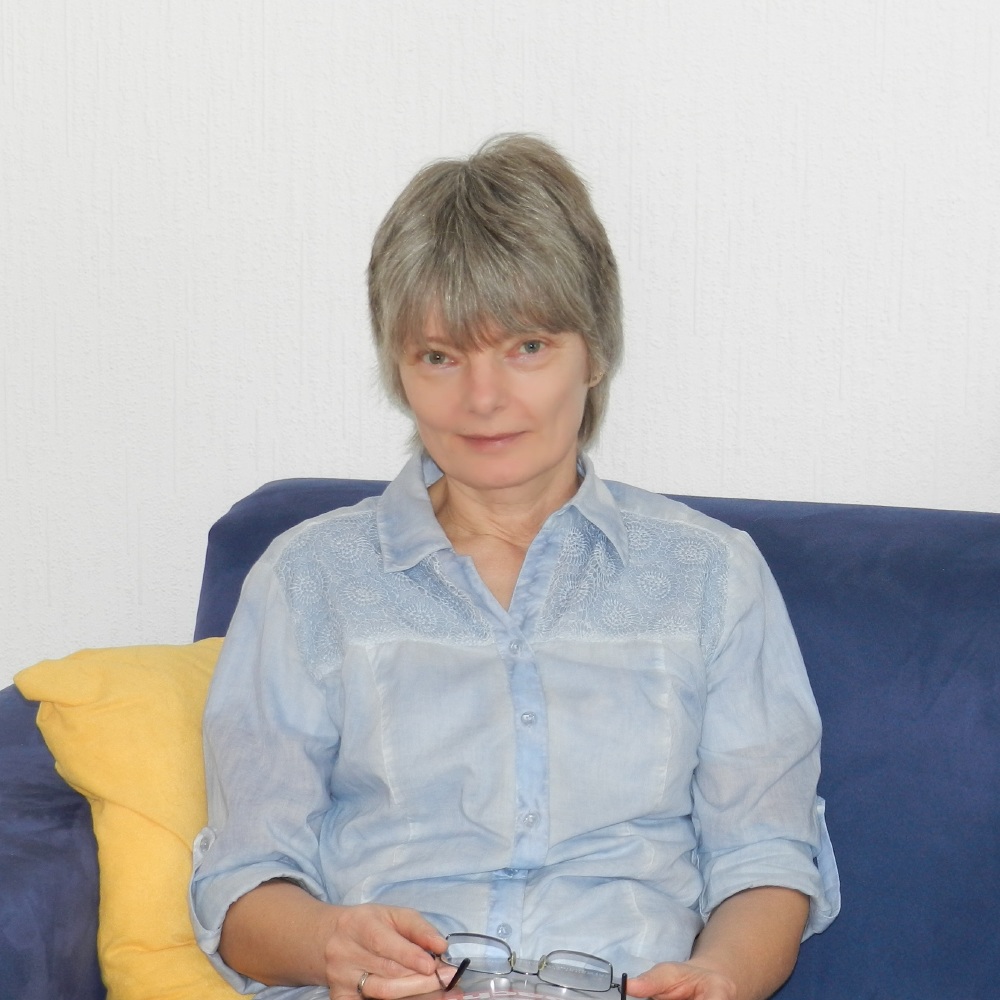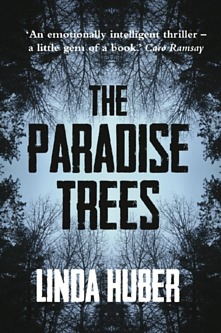
Linda Huber

The Paradise Trees follows single-mum Alicia back to her home village in Yorkshire. Having left home at sixteen to escape her abusive father, she has barely returned since, and is very apprehensive about doing so now. Once there, she starts having disturbing flashbacks about her early childhood and realizes she has suppressed much of her father’s ill treatment. This, in combination with the fact that she’s having to organise end-of-life care for him, preoccupies her so much she fails to notice that she and eight-year-old Jenny are being stalked by the Stranger.
The chapters alternate between his point of view and Alicia’s, and although the identity of the Stranger is hidden till the end of the story, the reader learns why he is so attracted to them both and what he plans to do to them.
Why did you decide to set the book in Yorkshire?
Before writing about any location I like to be able to look at the sky there, feel the wind in my hair, get the smell of the place. I visit friends in Yorkshire quite regularly so I know the area and can picture the countryside my characters are moving through. Having said that, the village in my book is actually moulded on an island village in Scotland, because that’s the only small village I’ve ever known intimately, and the woods where Jenny and the Stranger meet are based on our local wood right here in Switzerland – so the location is kind of international!
You have had over 50 short stories and articles published, so do you have a preference between these or novel writing?
I enjoy both but novel writing is my real passion. In a novel there’s so much more scope to develop the characters and really get to know them. There’s also the aspect of ‘what if…’ when you’re writing novels – I see something on the street or on TV and think – ‘What if that happened in the book – how would the characters react, how might the story develop from there? And then I’ll go and change it and see what happens. It’s completely fascinating and my biggest regret at the moment is that I can’t do this anymore with The Paradise Trees!
Please tell us about your experiences of learning about methods of behaviour and how different people react and deal with stressful situations.
First of all I’m absolutely no expert here but it’s something I find interesting. When I was a newly-qualified physiotherapist I worked in a hospital which specialized in the treatment of people with acute head injuries – ‘coma patients’. I learned such a lot there just trying to help the relatives deal with their loved one’s condition and rehabilitation. Ordinary people, dealing with extraordinary events, mostly with grace and courage. Later, in Switzerland, I worked with handicapped children and did a course about how perception problems affect movement and behaviour. That led to a few ‘aha moments’ too.
You were born in Glasgow, so why did you decide to move to Switzerland?
The original idea was to work here for a year, learn some German, see Europe, and then go back to Glasgow! But before I knew it I had an amazing job I didn’t want to leave, two kids and a mortgage… (Not in that order of importance!) I did consider returning nine years ago when my husband died suddenly, but in the end we stayed. I’ve lived more than half my life here, I have dual nationality and really do feel Swiss as well as Scottish. Well – maybe I’m a little more Scottish!
You work in a school in a 12th century castle so how inspirational is this for your writing?
The part the school is in was ‘modernised’ a couple of hundred years ago but the tower is 12th century. The atmosphere is amazing. Old, old cobblestones in the courtyard; ancient stone walls and windy stairs in the tower; the views out to Lake Constance and the mountains seen through slits of windows. Incredible. It gives you a real feeling of continuity – just think of all the people, each with their own story, who’ve been there over the centuries. Arbon Castle will still be here when there’s nothing left of me anymore, and different generations will be as amazed by it then as I am now. Stories come and go; people live and then they die; but this old castle will be sitting here looking across the lake to Germany and Austria for centuries still.
This is your debut novel, so was the novel writing process anything like you initially thought?
That’s hard to say because my main hobby’s been writing ever since I was a child and The Paradise Trees has been evolving over many years. I can say though that the novel-editing process with Legend Press was a very positive experience and a real eye-opener too – I learned a lot doing that.
Who are your favourite authors?
Mary Higgins Clark, Ruth Rendell, Val McDermid, Elizabeth George. They each have at least one shelf in my bookcases. But there are many more. My collection starts with an Alice in Wonderland picture book and follows me through childhood, growing up, having kids – there are some books there with pages so yellowed and loose they’re almost unreadable. But I won’t let them go. Last year I threw out my Swallows and Amazons which was practically loose-leaf. I bought a replacement of course, but it just doesn’t feel the same. Lesson learned the hard way.
What is next for you?
Legend Press have accepted a second novel, The Cold Cold Sea, so I’m looking forward to editing it with them. It’s due out next September. And at the moment I’m working on a book set in two different generations of a family affected by Huntington’s Disease. The older generation part is set in Edinburgh so I’m enjoying that!

